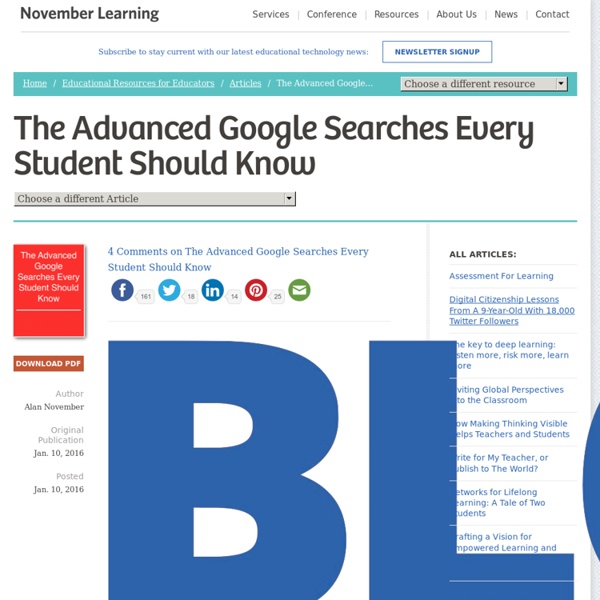The Advanced Google Searches Every Student Should Know - November Learning

http://novemberlearning.com/educational-resources-for-educators/teaching-and-learning-articles/the-advanced-google-searches-every-student-should-know/
Related: Week 6: Google: A Deeper Dive (*=Key reading)
• Research
*Google makes us all dumber: The neuroscience of search engines (Ian Leslie)
In 1964, Pablo Picasso was asked by an interviewer about the new electronic calculating machines, soon to become known as computers. He replied, “But they are useless. They can only give you answers.” We live in the age of answers. The ancient library at Alexandria was believed to hold the world’s entire store of knowledge. Today, there is enough information in the world for every person alive to be given three times as much as was held in Alexandria’s entire collection —and nearly all of it is available to anyone with an internet connection.
11 Ways to Teach Savvy Search Skills
3. Use the “three-source rule.” When students are doing online research in her class, Je Hen enforces the three-source rule. Students must confirm information they find on three different websites to make sure it’s valid. Try doing that with the tree octopus!
Refine web searches - Google Search Help
You can use symbols or words in your search to make your search results more precise. Google Search usually ignores punctuation that isn’t part of a search operator. Don’t put spaces between the symbol or word and your search term.
Google advanced search: A comprehensive list of Google search operators - Beyond
Common Google Search Operators by Roger Warner “Search Term” This operator searches for the exact phrase within speech marks only. This is ideal when the phrase you are using to search is ambiguous and could be easily confused with something else, or when you’re not quite getting relevant enough results back. For example: “Tinned Sandwiches” This will search for only the finer tinned variety of the bread based snack, at the exclusion of all others.
Google Scholar Support for Libraries
Google's mission is to organize the world's information and make it universally accessible and useful. Facilitating library access to scholarly texts brings us one step closer to this goal. We're thankful to the libraries and librarians who make it possible. We provide two ways to make it easier for your patrons to access the electronic and print resources in your library when they're using Google Scholar.
A Teacher’s Guide to Wikipedia
Wikipedia is often vilified in educational circles. The site’s loudest critics think that it offers biased, non-credible information. Many teachers specifically ban students from using the site from as a reference in research papers.
Lesson 1.2: Filtering by color (Text)
Lesson 1.2: Filtering by color Access Lesson 1.2 slides here Contents: Understanding square brackets Filtering by color Using color to define content Accessing similar images
Library / Home
tagged: summer-reading-2020 From Ms. Mabee: A very sweet love story that takes a modern spin on Pride and Prejudice.
Who's using it: WorldCat
Bill Carney, Content Manager, WorldCat "The Google Book Search APIs represent an important advance in accessing the content scanned on behalf of libraries participating in the Google Book Search Library Project. Working together enables us to increase the presence of these libraries and their collections on the Web."
The Essential Unique Search Tool Your Students May Have Never Used - November Learning
The Wayback Machine is as basic a reference tool for the Internet Age as a dictionary. When was the last time you saw a student use it? By Alan November When I’m giving a talk to students about being responsible digital citizens, I’ll tell them, “You know, some day you might apply to college, or run for Congress—and you might regret something you posted online when you were young.” And there’s always one student who will say to me, “Mr. November, we’re not that stupid—we’re going to take those things off the Web before we apply to college.”
Lesson Plans – Search Education – Google
Picking the right search terms Beginner Pick the best words to use in academic searching, whether students are beginning with a full question or a topic of just a few words. View lesson
How Google Book Search Got Lost
Google Books was the company’s first moonshot. But 15 years later, the project is stuck in low-Earth orbit. Books can do anything. As Franz Kafka once said, “A book must be the axe for the frozen sea inside us.” It was Kafka, wasn’t it? Google confirms this.
Related:



